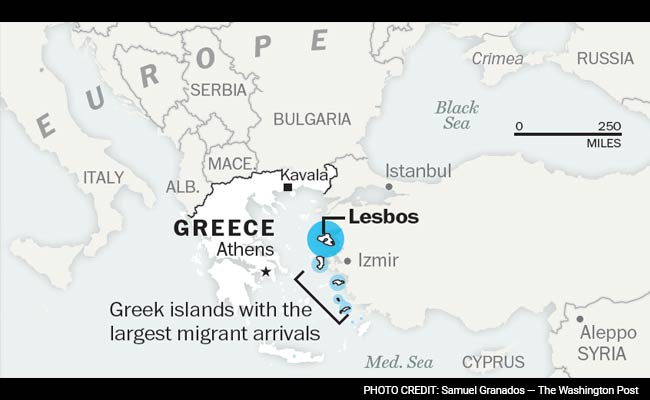By Griff Witte, The Washington Post
LESBOS, Greece: With its aqua-blue waters, olive-tree-studded hills and well-preserved ancient ruins, this jewel in the Aegean Sea can hardly be compared to an island built of landfill in the mouth of New York Harbor.
Yet in a year of unparalleled migration to Europe, Lesbos has been transformed from a quietly sublime slice of paradise to a modern-day Ellis Island. It’s the first port of call for a multiethnic, multinational tide of humanity seeking relief from war, persecution and poverty – the funnel through which thousands pass daily in search of a better life.
In recent months, the extraordinary pace of landings here has rivaled the historic peaks on the island that for decades formed the main gateway to the United States and that is still known worldwide as a byword for immigration.
But unlike Ellis Island, which was developed by the U.S. government specifically to process new arrivals, Lesbos’s role has emerged largely by happenstance. The solutions to the crisis are a patchwork thrown together by aid organizations, volunteers and local authorities, with comparatively little evidence of help from the Greek government or the European Union.
“Who’s in charge?” said Lani Fortier, who leads the International Rescue Committee’s efforts in Lesbos. “There’s no answer.”
Despite recent improvements that have calmed a situation once defined by chaos and squalor, the infrastructure here for welcoming, screening and registering people on their way into Europe remains inadequate given expectations of another surge in numbers come spring.
Lesbos’s emergence as a global migration center, officials here say, was no short-term anomaly.
“This will continue for another two or three years – at least,” said Marios Andriotios, spokesman for a beleaguered municipal government that has been crying out for help for much of this year.”We didn’t choose to be a hot spot in this crisis. The smugglers chose Lesbos.”
It’s easy to see why: Separated from the Turkish coast by a mere five miles, the island allows refugees and migrants to arrive here after a journey of hours on flimsy rubber dinghies, compared with the weeks people spent on giant steamships to reach Ellis Island. The new arrivals in the early 20th-century United States were largely fleeing from Europe; today, people are fleeing to Europe, having left behind a broad swath of man-made destruction stretching from South Asia to North Africa.
The boat bearing Husam Almasalmh to his new life came ashore in Lesbos soon after dawn one recent morning, just as the first light arced over the hazily blue Turkish mountains and splashed down into the crystal-clear waves lapping the Greek coast.
“My dream is real now!” the 19-year-old exulted as he ripped layers of packing tape – a crude attempt at waterproofing – from his cold, skinny legs.
But the culmination of Almasalmh’s journey from war-ravaged Syria to the peaceful sanctuary of Europe was just another Wednesday on Lesbos. As volunteers tended to a woman shivering uncontrollably from her hours at sea, a local couple walking their dog paused for a moment, then kept moving. Cars speeding to the nearby airport hardly braked.
Evidence of Lesbos’s transformation is everywhere. Buses that once ferried tourists to quiet coves now zip through the island day and night, transporting asylum seekers from remote landing spots to the central registration center, a barbed-wire-laden colossus set on a rocky hillside amid grazing sheep.
Lifeguards accustomed to standing watch over sunbathers now wade into the chilly surf in wet suits to ensure no one drowns as the heaving rubber boats motor onto shore.
In the shadow of a bronze Statue of Liberty look-alike – her torch held aloft, her green gaze steady – thousands of asylum seekers gather at the port clutching tickets affording them passage on a mega-ship bound for Athens.
Of the nearly 1 million refugees and migrants who have arrived in Europe by sea this year, 800,000 have come through the Greek islands. More than half of those have landed on Lesbos. That compares with just over 1 million arrivals during Ellis Island’s busiest year, 1907.
But the flows to Europe only began to surge in August. In October alone, 135,021 people landed here – more than 10 times the total from all of last year.
Even now, when winter winds foam the sea, some 2,500 people arrive daily, more than the number who arrived during all of December last year. If spring begins on the same scale, officials say the island will be unprepared to cope.
At the moment, there are accommodations for just 2,800 people. But in October, daily arrivals peaked at more than 6,000 – a number that could well be replicated in March or April.
“There needs to be a rapid expansion of the island’s capacity,” said Boris Cheshirkov, the Lesbos-based spokesman for the U.N.’s refugee agency, UNHCR. “We need to use winter to get ready.”
That process seems to be underway. The island’s two refugee camps have doubled in size in recent months, with hundreds of plastic, Ikea-made housing units replacing the worn canvas tents that had offered shade, but little else, through the summer and fall.
The new units will soon be equipped with wood floors and gas heaters to help ward off the rain and the cold as temperatures at night dip close to freezing. Bulldozers, meanwhile, are clearing land to make room for more, while plumbers install hot showers.
“We don’t have a resort here. We don’t have a five-star hotel. But we’re trying,” said Stavros Mirogiannis, the effusively affectionate retired military officer who was hired by the mayor to run a camp reserved for Syrian families. “I say to everyone who comes here, ‘Welcome to Europe.’ All these people are our guests, and we have to give them the best hospitality that we can.”
The fact that the camp is being managed at all is a relatively new development; for months, it was an anarchic sprawl of squalor that veteran international aid workers said was among the worst they had seen.
Now it is relatively clean and orderly, and it has won appreciation from its residents.
“I’d heard that Greece had many economic problems. I didn’t expect that they would treat us like friends,” said Mohammed Abdullah, a 44-year-old who said both his home and his electronics shop had been obliterated by bombs in Syria. “But they’re very nice.
They gave us things to eat and a place to sleep. They’re treating us like human beings.
There are good people in this world.”
The bus service, too, has dramatically changed life here, eliminating the need for new arrivals to trek 40 or more miles along twisting mountain roads.
And the presence of dozens of highly trained, professional lifeguards along the coast has undoubtedly helped to limit a death toll that had been rapidly climbing as the seas turned rougher.
“I didn’t want these refugees to come at first,” said Dimitris Amygdalos, a 26-year-old Greek lifeguard who has been volunteering on Lesbos. “But then I saw there are infants on the boats. There are children on the boats. They’re not terrorists, as most locals think. They are people almost like us who were thrown out of their country by their government and by ISIS. If that happened in Greece, I’d want another country to help us out.”
The government of Greece, beset by profound financial woes, is actually doing relatively little compared with the scale of the problem. The European Union, too, is hardly in evidence here, beyond the occasional visit from a passing dignitary.
The burden has instead fallen on local authorities, volunteers and a roll call of international aid organizations – many of which have had to divert resources from the world’s poorest countries to a crisis on European shores.
“The EU is the richest union on earth. It should be managing this shoulder to shoulder with Greek authorities,” said Cheshirkov, the UNHCR spokesman.
At least in some areas, the EU’s presence is poised to expand. Following an emergency request from the Greek government, the European border-security agency Frontex announced Thursday that it would send additional boats to patrol Greek shores and officers to help screen and register new arrivals.
Frontex had already doubled the number of officers deployed to Lesbos since October.
But EU member states had stalled on a further increase and will now be legally compelled to supply support that Frontex says is badly needed at a time of heightened security concerns. Two of the attackers in Paris last month traveled along the migrant trail through Greece using fake Syrian passports. Because of the continent’s visa-free Schengen zone, the Greek islands are effectively a border for all of Europe.
“The aim is that everyone who arrives here is thoroughly checked and registered. But we’re not there yet,” said Frontex spokeswoman Izabella Cooper. “The Paris attacks have only underlined the need to ensure that we know who is entering the EU”
Another EU initiative, meanwhile, is off to a slow start in Lesbos. The island is supposed to be a “hot spot” in which authorities sort those deemed eligible for asylum from those who aren’t.
The plan is critical to the EU’s strategy of reducing the number of people winding their way through Europe. But there is no infrastructure here to return failed asylum-seekers to their home countries, and there are few takers on the EU’s offer to relocate those deemed eligible to member states across the continent.
Out of a planned 160,000 relocations, just 159 have been completed – and only 30 from Greece. Although the system allows people to bypass the arduous journey that lies ahead after Lesbos, it can significantly delay their departure from the island and gives them no control over where they end up.
That wouldn’t work for Abdullah, the 44-year-old from Syria. His family has already been scattered by war: a wife and two children in Jordan, a son in Germany and Abdullah himself on an island in the Aegean. But not for long.
Only a day after his arrival, he was preparing to leave, with plans to follow the well-worn path up through the continent until he reached his destination: Germany.
“My son,” he said longingly, “will be there to meet me on the border.”



















